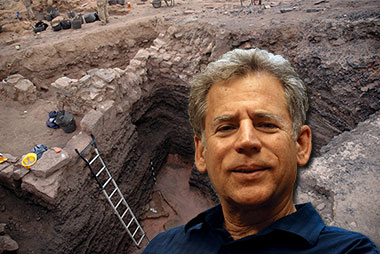UC San Diego Anthropology Professor Becomes Chair-Elect of ASOR Committee on Archaeological Policy
December 5, 2013 / By Tiffany Fox, (858) 246-0353, tfox@ucsd.edu
San Diego, Calif., Dec. 5, 2013 – Thomas E. Levy, a professor of anthropology at the University of California, San Diego, has been unanimously elected to as Chair-Elect of the American Schools of Oriental Research (ASOR) Committee on Archaeological Policy (CAP).
|
CAP supports excavations and related research in the Middle East and Eastern Mediterranean regions by encouraging high standards for excavations and fostering deliberate and ethical practices for research. Levy, who is the associate director of the Center for Interdisciplinary Science for Art, Architecture and Archaeology (CISA3) at the UC San Diego Qualcomm Institute, was elected to the position by ASOR’s Board of Trustees at its international meeting in Baltimore late last month.
According to Oystein S. LaBianca, professor at Andrews University and current chair of CAP, “Levy was nominated to this position because of his state-of-the art fieldwork in Wadi Faynan (Jordan) and beause of his inspired teaching and mentorship of future generations of Levantine archaeologists.” The Levant is a geographic and cultural region along the Eastern Mediterranean.
“I’m deeply honored to serve ASOR in this capacity and work with Oystein LaBianca over the next year to facilitate the good works that he has established for CAP,” said Levy. “I hope to facilitate growth, the adopting of more cyber-archaeology methodologies and excellence in research and publication.”
Part of CAP’s mission is to provide advice, encouragement, constructive criticism and a peer review process to scholars and academic institutions seeking affiliation with ASOR. Currently, there are 67 expeditions affiliated with ASOR from Cyprus, Egypt, Israel, Jordan, Syria, Bahrain, Turkey and the Palestinian West Bank.
Levy and his students from UC San Diego also presented papers at 10 different venues during ASOR’s meetings in Baltimore, most of which integrated state-of-the-art historical and anthropological theory based on fieldwork carried out in Jordan. Much of the research involved new methods of data capture, curation, analysis and dissemination developed in Levy’s Levantine and Cyber-Archaeology Lab.
Some of the graduate students who presented are part of the National Science Foundation’s Integrative Graduate Education and Research Traineeship (IGERT) for Training, Research and Education in Engineering for Cultural Heritage Diagnostics (TEECH) program, which is administered by the Qualcomm Institute. Levy and student Matthew Vincent served in a panel discussion entitled "Topics in Cyberinfrastructure I: Scholarship in the Twenty-First Century," which was organized by Chuck Jones of Penn State University and UCSD Alumni Sarah Whitcher Kansa and Eric Kansa, who are, respectively, the executive director and technology director of the of the Alexandria Archive. Eric Kansa was recently honored by the White House as a Champion of Change in promoting Open Science.
The other students who presented papers include:
- Aaron Gidding, who presented on “The Social and Political Organization of Early Bronze Age Southern Jordan: Preliminary Perspectives from Khirbat Hamra Ifdan.” The cyber-infrastructure program ArchaeoSTOR and its geo-spatial database, developed in collaboration with Tom DeFanti ‘s research group at the Qualcomm Institute, was highlighted as a research tool for identifying spatial patterning of 8 tons of pottery excavated from the site.
- Philip Graham (University of Connecticut, Storrs) and Levy, who presented on “Agriculture in the Desert? Preliminary Archaeobotanical Evidence from Chalcolithic Shiqmim, Nahal Beersheva Valley, Israel.” This research was based on data collected from Levy’s excavations in Israel in the early 1990s.
- Matthew Vincent, who delivered a paper concerning “The 2012 Season at Khirbat al-Balu’a: Report on the Completion of the GPS Mapping Project and Continued Excavation.” One of the largest and most important sites from Biblical Moab, this is the first systematic survey of the site that will serve as the foundation for identifying its ancient social and economic organization.
- Kathleen Bennallack, who gave an overview of the lab’s recent excavations of a unique 8th – 6th millennium BCE site titled, “Preliminary Excavation at Wadi Fidan 61: A Multi-0period Neolithic Site in Faynan, Southern Jordan.”
- Ian W. N. Jones, who has been working on the latest period of mining and metallurgy in the Faynan copper ore resource zone and presented on "Life in a Mining Village: Insights from Domestic and Public Buildings at Middle Islamic Khirbat Nuqayb al-Asaymir, Faynan, Jordan."
- Kyle A. Knabb, who presented a paper concerning his survey in a difficult to penetrate desert area. The paper was titled: “The Spices Must Flow: An Intensive Survey of the Buweirda Springs, an Oasis and Dunefield in the North Arabah Valley” and it focused on the role of the springs for the spice trade in late Antiquity.
The Levantine and Cyber-Archaeology Lab was also well represented in the Projects on Parade Poster session by Matthew Howland (who presented a poster titled, “DEM and Orthophoto Production through Balloon Photography and Structure from Motion”); and Matthew Vincent (“Digital Ecosystems Integrating Field Collection and Lab Management: Using web-services for the integration of disparate datasets.”
Related Links
The American Schools of Oriental Research
Media Contacts
Tiffany Fox, (858) 246-0353, tfox@ucsd.edu


